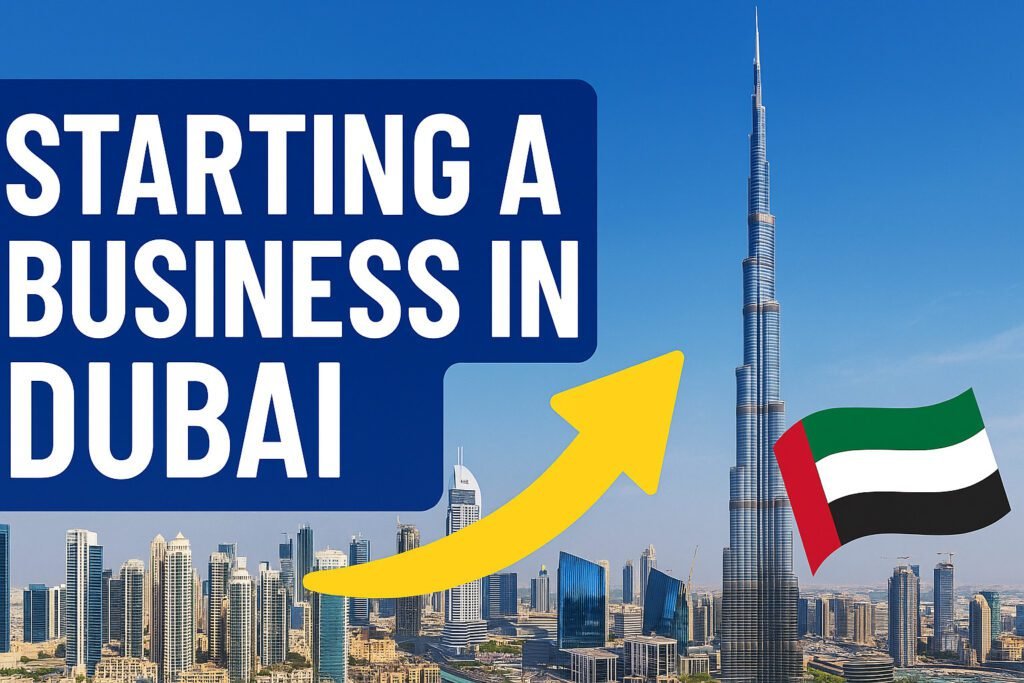How to Start a Business in Dubai – Step-by-Step Guide for Entrepreneurs
Introduction
Dubai has emerged as a world-class hub for innovation, trade, and entrepreneurship. With its strategic location bridging East and West, 0% personal and corporate tax in most sectors, and cutting-edge infrastructure, the city offers unparalleled opportunities for foreign investors and startups. Whether you’re an expat seeking to launch a tech venture, a consultant expanding services to the MENA region, or an SME aiming to tap into new markets, understanding how to start a business in Dubai is critical.
In this guide, you’ll learn:
What it truly means to start a business in Dubai and why the UAE is prime for growth.
The benefits and considerations of Mainland vs Free Zone vs Offshore setups.
Detailed, actionable steps—from choosing your legal structure and trade license to securing your investor visa.
Real-world costs in AED (ر.إ) and common pitfalls to avoid.
Grab a coffee, and let’s chart your path to success in one of the world’s most dynamic business ecosystems.
What Is “Starting a Business in Dubai”?
Starting a business in Dubai refers to the legal process of registering and licensing an enterprise under relevant UAE authorities, such as the Department of Economy and Tourism (DET), various Free Zone Authorities (e.g., DMCC, DIFC), or offshore jurisdictions. This process grants your company legal recognition, enabling you to open bank accounts, apply for visas, and conduct commercial activities in compliance with UAE laws.
Key terms:
Trade license (رخصة تجارية)
Commercial license
Investor visa (تأشيرة مستثمر)
Local Service Agent (LSA)
Why Is Starting a Business in Dubai Important?
Economic & Strategic Advantages
Tax Efficiency: 0% personal and corporate income tax in most cases.
Global Access: Proximity to Asia, Europe, and Africa markets.
Robust Infrastructure: State-of-the-art ports, airports, and digital networks.
Business-Friendly Policies: Rapid license issuance and visa processing.
Currency Stability: AED pegged to USD, minimizing currency risk.
Government Support & Incentives
DED’s SMART Services streamline Mainland company registration.
Free Zone Packages offer 100% foreign ownership, full repatriation of capital and profits, and no customs duties on import/export within the zone.
Benefits of Doing Business in Dubai
Full Foreign Ownership in Free Zones and select Mainland sectors (as per Cabinet Resolution No. 6/2021).
Zero Tax on personal income and most corporate profits.
Access to Funding: Numerous venture capital firms, government grants, and accelerator programs.
Talent Pool: Diverse workforce and easy hiring of international talent.
Operational Ease: Online portals like DED SmartServices and eChannels by Free Zones.
Free Zone vs Mainland vs Offshore: Choosing the Right Jurisdiction
| Jurisdiction | Ownership | Geographic Scope | Office Requirement | Visa Quota |
|---|---|---|---|---|
| Mainland | Up to 100%* | Anywhere in UAE | Physical office | Based on office size |
| Free Zone | 100% | Zone only | Flexi desk to warehouse | Fixed per package |
| Offshore | 100% | Outside UAE trade | None | None |
*Depending on sector, Mainland companies may still require a local sponsor (UAE national) under specific categories.
When to choose Mainland: Local trading, contract bidding, retail outlets.
When to choose Free Zone: Export/import activities, international service companies, tech startups.
When to choose Offshore: Holding companies, international consulting with no local operations.
Step-by-Step Process to Start a Business in Dubai
Step 1: Determine Business Activity and Legal Structure
Identify Activity: Check the DET or relevant Free Zone’s list to ensure your service/product is permitted.
Choose Legal Form:
Sole Proprietorship/Sole Establishment (Ideal for one-owner professional services)
Limited Liability Company (LLC) (2–50 shareholders; Mainland)
Free Zone Company (FZE/FZC) (1–5 shareholders)
Branch Office (Native/Foreign company branch)
Civil Company (Professional partnerships)
Step 2: Reserve a Trade Name
Check availability and compliance with naming conventions (no religious or offensive terms).
Apply via DET SmartServices or Free Zone portal.
Cost: AED 500–1,000 depending on jurisdiction.
Step 3: Apply for Initial Approval
Submit business plan, passport copies, and filled application form.
Receive No Objection Certificate (NOC) from authorities.
Timeframe: 1–3 days.
Step 4: Draft Constitutional Documents
LLC: Memorandum of Association (MOA) notarized at a UAE Notary Public.
Sole Establishment: Local Service Agent (LSA) agreement if required.
Step 5: Choose & Lease Office Space
Mainland: Physical office minimum 200 sq. ft. as per DED requirements.
Free Zone: Options range from flexi-desk to full offices or warehouses.
Cost: AED 5,000–50,000 annually depending on location and type.
Step 6: Obtain Additional Approvals (If Required)
Specific sectors like healthcare, media, education, and security need external approvals from respective ministries.
Step 7: Final Submission & Fee Payment
Upload notarized documents, lease agreement, and approvals.
Pay licensing, registration, and visa fees online.
Total Licensing Fees: AED 10,000–25,000 (varies by activity and zone).
Step 8: Collect Your Trade License
Once payment is processed, download your digital trade license.
Timeframe: 1–2 days post-submission.
Step 9: Register with Immigration & Apply for Visas
Investor Visa: Valid 1–3 years; includes dependents (spouse, children).
Emirates ID: Process via ICA; complete medical fitness test at DHA or relevant authority.
Visa Costs: AED 3,500–7,000 per visa.
Step 10: Open a Corporate Bank Account
Present trade license, office lease, shareholder passports, and board resolution (if applicable).
Top banks: Emirates NBD, ADCB, FAB, Mashreq.
Tip: Explore digital banking options like LIV by Emirates NBD for startups.
Costs & Considerations in AED
| Cost Item | Mainland (AED) | Free Zone (AED) |
| Trade Name Reservation | 500–1,000 | 600–1,200 |
| Initial Approval | 100–300 | 200–500 |
| License Issuance | 10,000–20,000 | 12,000–30,000 |
| Office Lease (Annual) | 10,000–50,000 | 5,000–40,000 |
| Visa Processing (each) | 3,500–6,000 | 4,000–7,000 |
| Emirates ID Registration | 370 | 370 |
| Medical Fitness Test | 200–800 | 200–800 |
Note: Actual costs depend on business activity, jurisdiction, and package selected.
Common Mistakes & FAQs
Assuming 0% Tax Applies Universally: Certain strategic sectors may incur fees or taxes.
Not Checking Activity-Specific Approvals: Always verify external approvals for regulated activities.
Delaying Office Setup: License issuance often requires proof of physical address.
Neglecting Renewal Dates: Trade licenses and visas must be renewed annually or per validity period.
FAQ – People Also Ask
Q1: How long does it take to start a business in Dubai?
Typically 7–15 business days, depending on jurisdiction and any external approvals needed.
Q2: Do I need a UAE national sponsor for my business?
Only certain Mainland LLCs in restricted sectors require a 51% local sponsor; Free Zones offer 100% foreign ownership.
Q3: What is the difference between a Mainland and Free Zone license?
Mainland licenses allow trading anywhere in UAE, while Free Zone companies are restricted to activities within their zone and offshore.
Q4: Can I sponsor my family on my investor visa?
Yes, you can sponsor spouse, children up to age 18–21, and domestic help depending on your visa category and salary criteria.
Q5: Is there a minimum capital requirement?
No minimum capital for most Mainland and Free Zone setups, except for certain activities like financial services.
Conclusion
Starting a business in Dubai blends dynamic growth prospects with streamlined processes—provided you plan carefully. From selecting the right jurisdiction (Mainland vs Free Zone vs Offshore) to securing your trade license and investor visa, each step requires attention to detail and adherence to UAE regulations. With AED-based cost clarity and strategic planning, you can harness Dubai’s pro-business environment and unlock global opportunities.
Ready to launch your Dubai venture? Contact our UAE business setup experts for tailored guidance and seamless execution.




